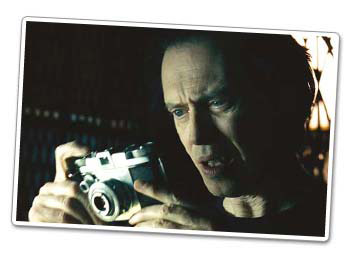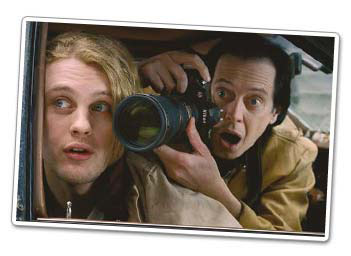From Oblivious to Delirious
by Gary Goldstein
Though writer/director Tom DiCillo has made a half-dozen indie features, he's best known for his 1995 sleeper comedy Living in Oblivion, a clever, satirical look at low-budget filmmaking. DiCillo now reunites with Oblivion's Steve Buscemi for another jab at the world of celebrity, this time through the eyes of a scrappy paparazzo and a homeless, aspiring young actor (Michael Pitt), in the funny and insightful Delirious. Reel's Gary Goldstein recently had the chance to chat with the friendly, New York-based DiCillo about his latest work.

Reel: You've made at least three other films about the world of fame and celebrity [Johnny Suede, Living in Oblivion, and The Real Blonde]. What's the fascination?
Tom DiCillo: I don't necessarily feel that fame and celebrity require more importance or attention than anything else in life, though I will say that there's something that happens to people when they are in the entertainment or fame game that brings out the most intense human behavior. It becomes so absurd so instantly when you see what it makes people do. It's those extremes that fascinate me.
Reel: How did you end up writing the script for Delirious?
TD: There's this one paparazzo I've had to throw off the set of every one of my films. The last time I threw him off, he almost got in a fight with me--he was just daring me to touch him so he could sue the hell out of me. It was crazy! But I said, wait a minute, this behavior is so intense, maybe there's a story to be told from the point of view of the paparazzi. What makes them tick? Do they have any moral conscience whatsoever? I ended up hanging out with this same photographer for about two, three months and learned quite a bit about paparazzi. And a script was born.
Reel: What about the character of Toby, the actor? How did he develop?
TD: Since fame is created on a weekly basis in our country now with shows like American Idol and such, I started wondering, does a real star actually exist? And if so, what makes somebody a real star? So I decided to bring these two strands together--the paparazzi and the aspiring star. I loved the idea of two people who don't seem like they'd ever get along somehow forming a bond.
Reel: What's happened with regard to fame, the media, and the public's interest in celebrity over, say, the last eight or nine years since you made The Real Blonde that affected your approach to writing Delirious?
TD: That's a very good question. This world of celebrity is shifting and expanding instantly and the moment you try to catch up with it, much less make a film about it, it's already changed. I tried to just create my own little exaggerated version of that world so that by the time the movie did come out it wouldn't seem as literal as what might be happening in reality.
Reel: Steve Buscemi, who you've worked with twice before, gives one of his best performances ever here. You wrote the movie for him, correct?
TD: I did, though at first he passed on the script. I was astounded. He said he respected my desire to make the photographer as realistic and unromanticized as possible but, at the same time, he needed to feel a bit more humanity in the character. To me, I love the parts of Les where he just lets it all out, when he yells at Toby, when he gets nuts. And I just love Steve in those scenes. Fortunately, he ultimately decided to do the film. He brings such an emotional resonance to the part that, as moving as it is, it's still funny.
Reel: It's a great comic performance, as well as a great serious one.
TD: I hope people recognize that. I think he's so brilliant, though some people have said, "Oh, that's just Steve doing his typical stuff."
Reel: Well, there's the hazard when an actor is consistently good that people just start taking his work for granted--though clearly you're not one of them. What is it about Steve that makes you keep coming back to him?
TD: I'll answer that by speaking selfishly. When you work on limited budgets with limited shooting time like I do, you have to move quickly. There's not a lot of time for experimentation and discussion and you need to surround yourself with actors who will get the job done with a minimum of fuss. When you encounter unexpected resistance from an actor it's really difficult. You can pretend it's okay and try to work through it, but if that resistance just keeps going and going, it's the most destructive thing on the set of a movie. My experience with Steve Buscemi is the entire opposite of that. And it's not that he just does what I tell him to do, it's that we trust each other. He has a willingness as an actor that is so liberating and so enjoyable, I always look forward to seeing him on the set. Steve's imagination is also beyond comprehension--he loves to leap out and take chances. He's truly the most generous actor I've ever met.
Reel: Let's talk about Michael Pitt. Though he's made a number of films, he's still way less experienced than Buscemi, yet totally holds his own here. How did you choose him to play Toby?

TD: It was a tough role to cast. I wrote the part then realized, after I finished it, that I'd kind of written myself into a corner. I knew if I didn't cast the right person, I'd be in real trouble. I needed someone who'd be believable climbing out of a dumpster or walking down the red carpet--someone who could seem like a star. I'd seen and liked Michael's work in Hedwig and the Angry Inch and The Dreamers and felt he could encapsulate the two sides of Toby. I have to say, he was terrific.
Reel: You've worked with a young Brad Pitt in one of his first films, Johnny Suede, and now [the unrelated] Michael Pitt in Delirious. Aside from their good looks and last name, any similarities between them as actors?
TD: They both had a very strong commitment towards being honest and truthful. If something seemed fake to them, they couldn't do it. They were both totally willing to go to whatever places they needed to honor their characters, which is always so important.
Reel: My favorite scene in the movie is when Les visits his parents [played by Tom Aldredge and Doris Belack] and they're totally dismissive of his photography, which he's so proud of. It's a sad but also hilarious scene that's probably very truthful for lots of "artists" and their parents. Is it autobiographical in any way?
TD: Absolutely. Let's face it, family can be one of the most destructive things in your life--whether they intend to be or not. In this instance, Les is simply looking for something he's probably been looking for from his parents his whole life, just a little validation. But they refuse to give it to him and, instead, make him feel like he's worthless. His father especially refuses to acknowledge his son in any way. The tragedy, sometimes, is that children keep going back to their parents for approval, even though they know it's a dead end street.
Reel: I also loved the party scene in which Les panics when he has to face the celebrities one-on-one, without the safety of a camera between them. It seems to say it all about who Les is.
TD: Throughout the whole film Les is telling Toby that everyone's equal. But the moment Les comes face to face with a real celebrity, he realizes his own self-esteem is so low that he's not equal. Les sees that, without anything blocking it, for the first time in the movie and it renders him speechless. It's a pivotal moment--for Les and for Toby.
Reel: You make Les a pretty sympathetic character despite all his acting out and craziness. How much did you want the audience to stay on his side?
TD: I wanted the audience to at least understand where Les is coming from. One of the things that's most disappointing about entertainment for me today is that characters are either completely good or completely bad. But that's just not life. I love characters that have desperate qualities about them, but then other things that make them human. I look for those sorts of contradictions in characters. I wanted people to see that Les was damaged--and that every one of us, in our own way, has some form of that damage.
Reel: Did you have any concern about shifting the tone from light to darker and more potentially tragic as the film went along?
TD: I was concerned about it mainly because I didn't want the audience to feel as if they'd suddenly found themselves in another theatre. There needed to be some consistency of idea that carried through. The trick here was in shifting between some rather ludicrous comedy and, at other times, some rather bizarre emotional comedy. I called the film Delirious because, to me, it implied the kind of rollercoaster journey the audience would go on watching it. How, at times, it may delight you and, at other times, you'll be deliciously frightened--because sometimes the idea of danger can be enjoyable.
Reel: Despite everything that goes down by the end of the film, the movie still ends on a hopeful note. Are you ultimately optimistic about the concept fame and celebrity?
TD: I see the film as both a reaffirmation and homage to the concept of why we keep going to the movies--why we keep doing this eternal thing that we do. My feeling is that we go to movies because film enables us to see some reflection of ourselves in a way that no other art form really does. Who knows, maybe that is a kind of optimism?
Reel: By the way, I've checked out the movie's website. Those "marketing" podcasts you created are pretty funny.
TD: They're made up, of course, but when we first leaked them, a lot of people thought they were real. Can you believe it?
Reel: I guess you must be a good director or something...
| 





